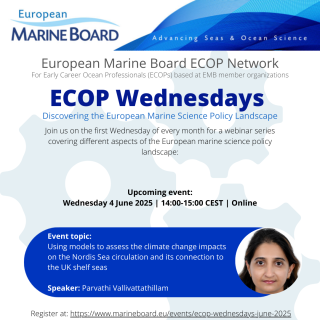
In this edition of the ECOP Wednesdays event series, hosted by the EMB Young Ambassadors and the EMB Secretariat for the EMB ECOP network, Parvathi Vallivattathillam spoke about "Using models to assess the climate change impacts on the Nordic Sea circulation and its connection to the UK shelf seas".

Parvathi Vallivattathillam introduces herself: I grew up in a coastal state in India, where life is profoundly shaped by one of the most dynamic monsoon systems on Earth. This early exposure to powerful natural cycles sparked my interest in oceanography, leading me to pursue a master’s degree in Oceanography from the Cochin University of Science and Technology, Kerala, India. By the end of my master’s I got some hint of the huge potential of this applied field has in addressing societally relevant research problems. Subsequently, I started my doctorate research and earned my PhD in Marine Science from the National Institute of Oceanography, Goa, India, and later completed a postdoctoral fellowship at New York University in Abu Dhabi. During both my PhD and postdoc, I used ocean models to investigate bio-physical interactions in the Arabian Sea across various timescales.
In June 2023, I joined in my current role as a research scientist at the National Oceanography Centre (NOC) in Liverpool in the Marine Physics and Ocean Climate group. My current research continues to leverage ocean models, but with a focus on the Atlantic Ocean. I primarily investigate the linkages between the Atlantic Meridional Overturning Circulation (AMOC) and heat and freshwater transport, as well as the circulation dynamics of regional seas like the North Sea.
The AMOC is a critical component of the global climate system, redistributing heat and freshwater and influencing nutrient and dissolved gas transport, thereby affecting marine ecosystems. The northern Atlantic Ocean, particularly the Nordic Sea, is a key region for water mass transformation that regulates AMOC strength and extent. Warm tropical waters cool in the Nordic Sea, driving deep convection and forming a vital link between polar and lower latitude waters. Using a globally downscaled model, this study assesses the impacts of climate change on the Nordic Sea circulation and its connections to the UK shelf seas. Specifically, we identify major pathways through which Arctic climate signals propagate into the North Atlantic and the UK shelf. Preliminary findings suggest a strengthening of boundary currents in the Nordic Sea, which significantly diminishes the transport of Atlantic waters into the North Sea. Our analysis also reveals the emergence of pronounced climate change signals around the 2040s, persisting through the 2080s. Alongside widespread warming, we observe consistent salinity and circulation anomalies during this period, highlighting the potential for haline-driven changes in the Nordic Sea hydrography under future climate scenarios.
The presentation slides can be found here.